As tensions between the United States and Iran continue to escalate, fears of another large-scale military conflict are mounting across the globe.
With fiery rhetoric, regional battles, and concerns over nuclear ambitions back in the headlines, many are warning that the world could be edging dangerously close to a war with devastating consequences.
The anxiety echoes a chilling chapter from the past when, in 1945, the US dropped the first atomic bomb on Hiroshima, instantly killing tens of thousands and ushering in a new era of warfare.
Nearly 80 years later, the images of that destruction remain a sobering reminder of what’s at stake should diplomacy fail once again.
On August 6, 1945, the world changed forever when the first atomic bomb was dropped on the Japanese city of Hiroshima, causing unprecedented destruction.
The United States detonated the weapon over the city and, together with the bombing of Nagasaki three days later, killed between an estimated 129,000 and 226,000 people.
Many first-hand witness accounts of the atrocity have survived in the 79 years since the bomb was detonated – but one of the most detailed descriptions is preserved in a diary kept by Japanese doctor Michihiko Hachiya, who recorded everything from the initial blast to the long-term health impacts on victims.
Dr. Hachiya’s notes were republished in The Doctor Of Hiroshima in 2024, making for an invaluable historical document about what really happened when the world’s first nuclear weapon was detonated.
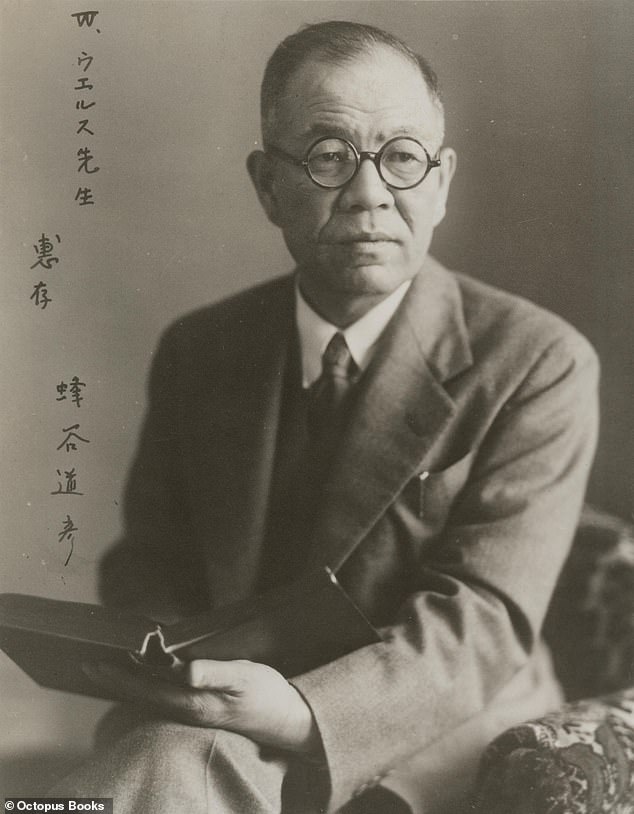
Japanese doctor Michihiko Hachiya kept a diary documenting the aftermath of the atomic bomb hitting Hiroshima on August 6, 1945
Originally published in a small Japanese-language medical journal and first translated into English in 1955, the powerful diary brings the events of August 6 to life once more – and reveals exactly what happens to people after an atomic bomb explodes.
Hachiya, himself seriously wounded in the blast, was the Director of the Hiroshima Communications Hospital.
Comprising of 20 staff and around 125 beds, the medical center was of considerable importance at the time.
The hospital was located only 1,500 meters from the blast and a few hundred meters from Hachiya’s home.
While all buildings in the area appeared to fall to the ground due to the impact of the bomb, the hospital remained standing and became a place of refuge for the injured.
The doctor’s writings give insight into the day the bomb was dropped – with the first line of the diary describing how peaceful the city was before the attack: ‘The hour was early; the morning still, warm and beautiful.’
But all changed when the bomb – which Hachiya calls ‘pikadon’ (pika = the Japanese word for bright flash of light; don = loud boom) – hit the city.
The doctor wrote: ‘Suddenly, a strong flash of light startled me.’
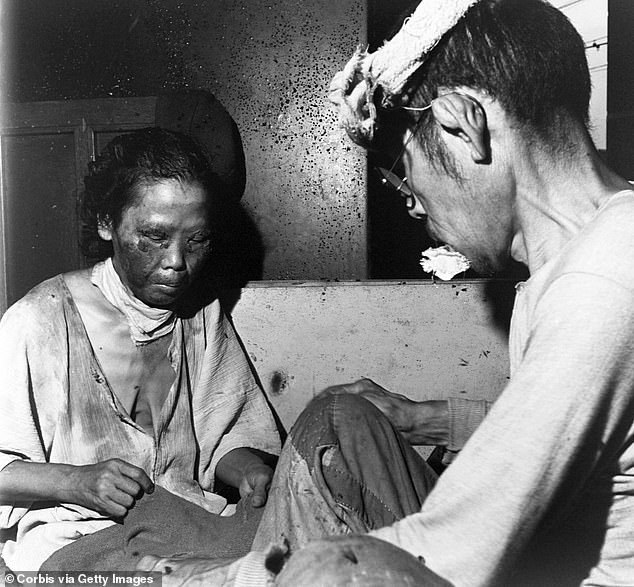
The Japanese doctor’s diary describes some of the horrific injuries caused by the bomb as people’s skin ‘peeled off’
The force of the blast was so powerful that it stripped all the clothes from his body as he continued: ‘To my surprise, I discovered that I was completely naked.’
He added a few pages later: ‘It occurred to me that, like myself, some strange thing had deprived [other victims] of their clothes.
‘The uncanny stillness was broken. Our little world was now in pandemonium.’
Harrowing descriptions of the destruction of the city follow – as well as the gruesome realities of many of the injuries.
Hachiya managed to explain the sheer devastation across the city, writing: ‘Hiroshima was no longer a city but a burnt-over prairie.
‘To the east and to the west everything was flattened. The distant mountains seemed nearer than I could ever remember… how small Hiroshima was with its houses gone.’
The doctor wrote of injured citizens: ‘The people who were burned suffered most because as their skin peeled away, glistening raw wounds were exposed to the heat and filth.’
Hachiya’s friend Mr. Katsutani also offered his own descriptions: ‘They had no faces! Their eyes, noses and mouths had been burned away, and it looked like their ears had been melted off…
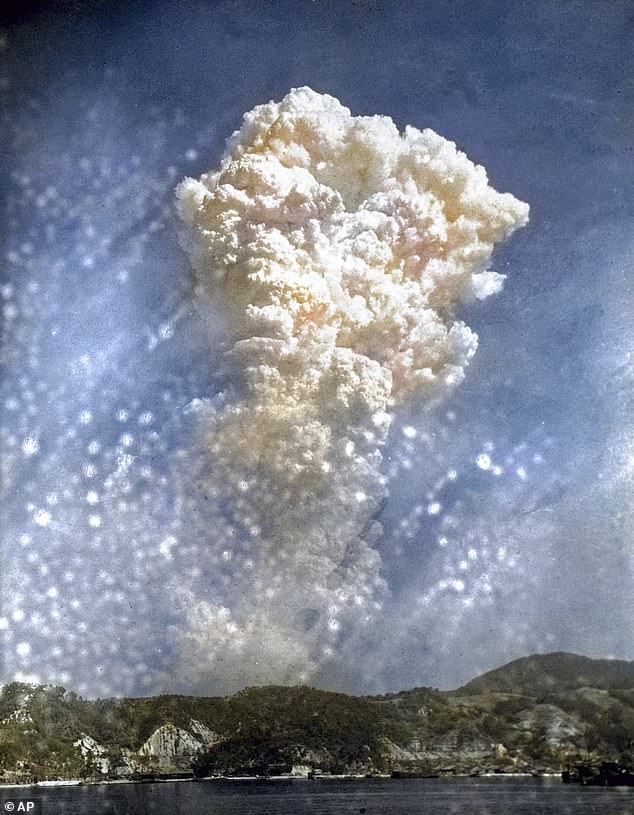
A digitally colorized image shows smoke rising 20,000 above the city after the bomb was dropped
‘Even the playground was packed with the dead and dying. They looked like so many cod fish spread out for drying.’
Though bed-bound, over the course of the following two months the doctor observed the devastating impact of the bomb on the city and its people in what was described as a ‘heartbreaking and inspiring true-life story.’
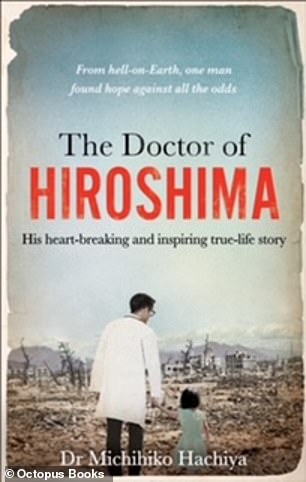
Dr. Hachiya’s notes were republished in The Doctor Of Hiroshima in 2024, making for an invaluable historical document about what really happened when the world’s first nuclear weapon was detonated
Even Warner Wells, who first translated the diary into English in 1995, admitted that the diary’s contents were so frightening that he ‘came to dream of the bombing, and on occasion awakened in terror.’
Roughly half of deaths occurred on the first day, but for months afterwards many continued to die from the ongoing effects of the bomb.
This is something that Dr. Hachiya took great pains to describe in the diary, noting initial side effects including nausea, vomiting, and diarrhea – while some people died mere days after seeming ‘perfectly well.’
Later symptoms seemed to include malaise and anorexia. And on August 21, he began to notice that he and other patients were losing their hair – but this did not seem to be linked to the number of burns they had received.
At one point, he observed that he had around 150 scars marking his body after the attack.
Earlier entries in the diary question what the ‘new weapon’ was that has caused such catastrophic destruction on the city.
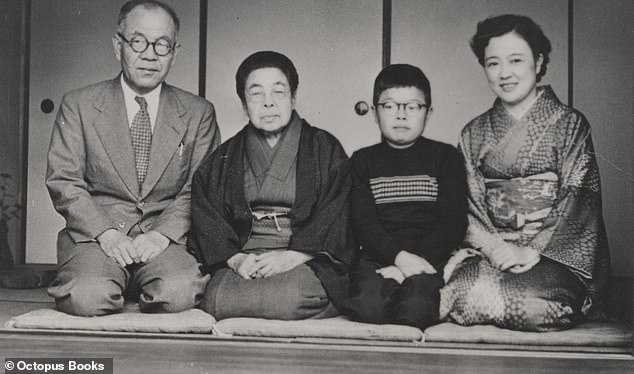
Dr Hachiya is seen with with his mother, son, and wife in 1955
Entries show the hospital’s occupants found out about the bombing of Nagasaki on August 11, two days after it occurred, and they did not discover that it was an atom bomb until the following day.
Another surreal episode of misinformation comes when Hachiya is told that Japan also possesses such a weapon and has in fact retaliated against the US, leading him to believe that San Francisco, San Diego, and Los Angeles had been hit.
The ‘news’ provided such excitement that the doctor was able to get out of bed for the first time since he was injured.
Hachiya wrote: ‘A man came in from Fuchu with the incredible story that Japan had the same mysterious weapon, but until now had kept it a strict secret and had not used it because it was judged too horrible even to mention.
‘This man went on to say that a special attack squad from the navy had no used the bomb on the mainland of America and that his news had come from no less a source than General Headquarters.’
The doctor’s final journal entry came on September 29, 1945, after the arrival of US troops – almost two months after the bomb exploded.
Dr. Hachiya himself was a remarkable survivor and lived to the age of 77, dying in 1980.
His story lives on as a devastating account of the effects of the US’ $2 billion Manhattan Project – and how it changed the nature of weaponry forever.











